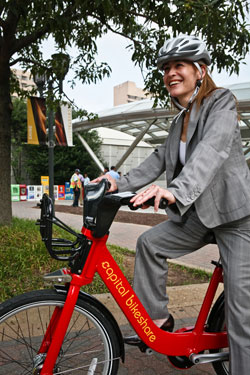A recent US News and World Report article explored the economics of bike sharing -- noting that cities weren't profiting from their new systems.

That is hardly news. Few cities expected the popular form of public transportation infrastructure to be a cash cow.
More remarkable is the news that Washington, D.C.'s Capital Bikeshare, the country's premier system, is nearly operationally profitable, according to the U.S. News story:
Since its start in September 2010, Capital Bikeshare has taken in $2.47 million and spent $2.54 million on operating expenses. And that doesn't even include the expensive things, like docking stations—which can cost well over $50,000 each—plus the bikes themselves. Those capital costs, at $7 million thus far, are covered by federal funds.
Roads, transit, sidewalks -- no one is going around asking why they aren't profitable in their first year and a half. No one expects that.
From a purely financial standpoint, bike-sharing in Washington is a much better value, as Streetsblog Network blog Systemic Failure points out:
That is an astounding 97% “farebox” recovery. To put in perspective, the average rail system in the US is lucky to earn back more than 50%. The typical bus service gets back less than 20%.
And then there is the capital cost — a whopping $7 million. By comparison, a single 70-seat BART railcar will cost over $5 million.
There are dozens of reasons why bike-sharing is sweeping the country. The fact that they are cheap to build and operate, compared with the alternatives, is just icing on the cake.





